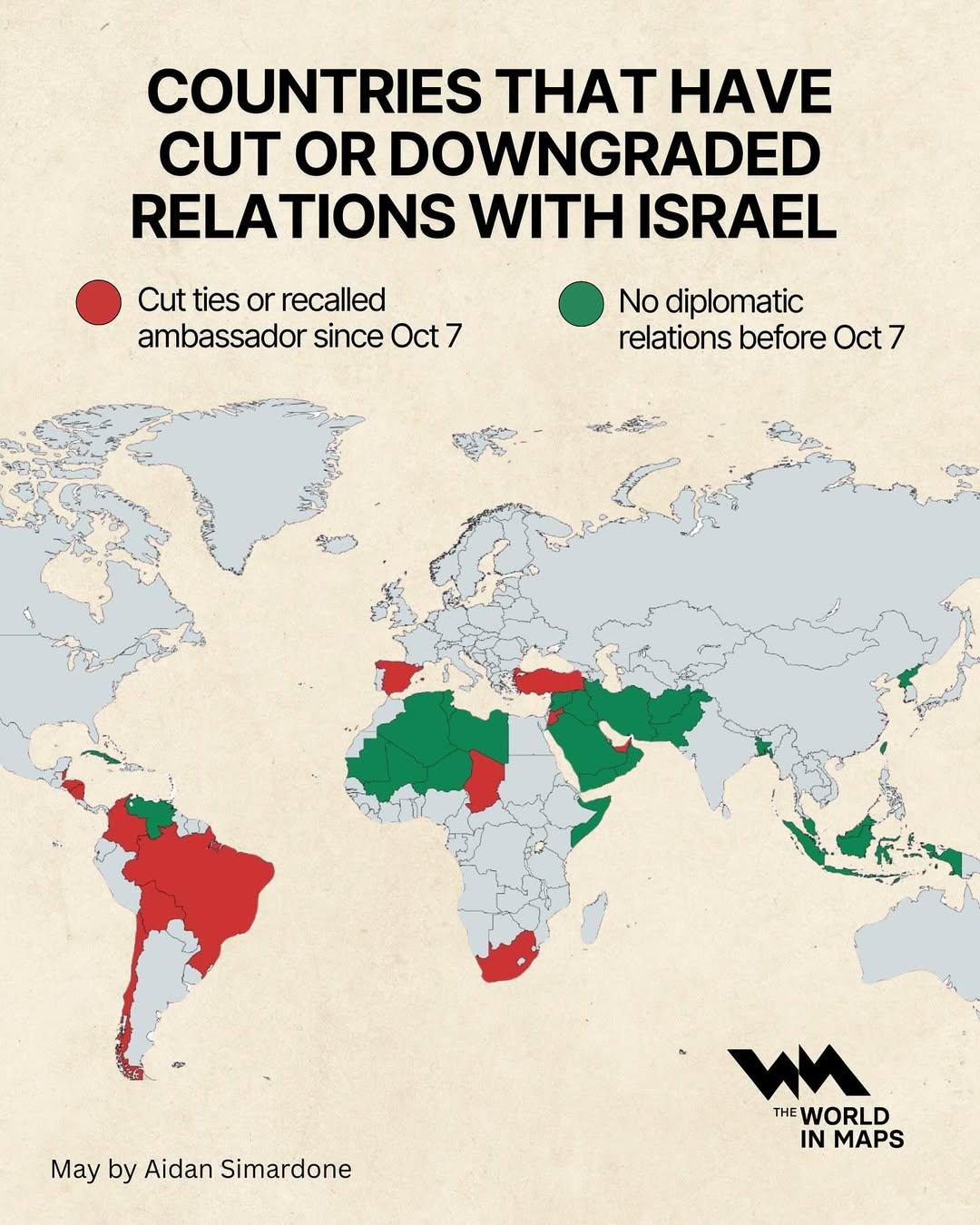Countries That Have Cut or Downgraded Relations with Israel Map


Marcus Rodriguez
Historical Geography Expert
Marcus Rodriguez specializes in historical cartography and geographic data analysis. With a background in both history and geography, he brings unique...
Geographic Analysis
What This Map Shows
This map visualizes the countries that have recently cut or downgraded their diplomatic relations with Israel. It highlights the geopolitical landscape surrounding Israel, indicating which nations have opted for a more distanced relationship. As tensions in the region evolve, understanding these diplomatic shifts is crucial for analyzing the broader implications on international relations, trade, and regional stability.
Deep Dive into Diplomatic Relations with Israel
Diplomatic relations are essential for fostering cooperation, trade, and mutual understanding between nations. In the case of Israel, its foreign relations have been complex, influenced heavily by historical, cultural, and political factors. The recent trend of countries downgrading or severing ties with Israel often relates to its policies in the Palestinian territories and responses to regional conflicts.
Historically, Israel has faced diplomatic isolation from several countries, particularly those in the Arab world. However, the normalization agreements signed in 2020 between Israel and several Arab nations, known as the Abraham Accords, marked a significant shift. Interestingly, after this breakthrough, some nations that had previously engaged with Israel have reconsidered their stances, either in response to domestic pressure or regional dynamics.
For instance, countries like Turkey and South Africa have taken steps to downgrade their relations with Israel in recent years. Turkey, once a close ally, has seen a deterioration in ties, driven by Israel's policies towards Palestinians. Similarly, South Africa has consistently criticized Israeli actions and downgraded its diplomatic representation in protest.
The map also indicates countries in Latin America, such as Bolivia and Venezuela, which have taken similar steps. This reflects a larger trend in the region, where leftist governments often align against Israel due to perceived injustices against the Palestinian people. The downgrading of relations often leads to the closure of embassies or the expulsion of diplomats, thus signaling a significant shift in bilateral relations.
Moreover, the impact of international organizations cannot be overlooked. The United Nations has been a platform where many of these discussions take place. Countries that downgrade relations with Israel often rally support within the UN to address what they view as violations of human rights and international law. The ongoing debates and resolutions concerning Israel and Palestine illustrate the contentious nature of its diplomatic relations.
Regional Analysis
Examining the map reveals distinct patterns across different regions. In the Middle East, countries like Iran and Syria have maintained a long-standing opposition to Israel, rooted in historical conflicts and ideological differences. Their positions are often reinforced by alliances with groups like Hamas and Hezbollah, which actively oppose Israeli policies.
In contrast, some nations in the Gulf region, such as the UAE and Bahrain, have recently established ties with Israel, marking a notable shift in regional dynamics. However, this new alignment has not been universally accepted. Countries neighboring these Gulf states often criticize their rapprochement with Israel, leading to a complex web of diplomatic relations.
In Africa, the map shows a mixed bag of responses. While nations like South Africa openly criticize Israel, others have chosen to engage diplomatically. This divergence can often be attributed to historical ties, economic interests, and varying political ideologies. For example, countries with significant economic ties to Israel may hesitate to sever relations, even when public sentiment may lean towards supporting the Palestinian cause.
Significance and Impact
Understanding the countries that have cut or downgraded relations with Israel is vital for grasping the current geopolitical climate. These shifts can have far-reaching implications, not only for Israel but also for global politics. As countries reassess their diplomatic ties, the potential for increased regional tensions becomes a real concern.
Moreover, these changes can affect trade agreements, military alliances, and humanitarian initiatives. For instance, countries that sever ties with Israel may also withdraw from collaborative defense agreements or trade partnerships, which can hinder economic growth in both regions.
Looking ahead, it's essential to consider how these relationships will evolve. Will countries that have downgraded relations reconsider their stance in light of changing political landscapes? As emerging leaders take power and public opinion shifts, the diplomatic map may continue to transform, necessitating ongoing analysis and understanding of these complex relationships. The future of Israel's international standing remains uncertain, heavily influenced by regional developments and global political trends.
Visualization Details
- Published
- September 9, 2025
- Views
- 72
Comments
Loading comments...